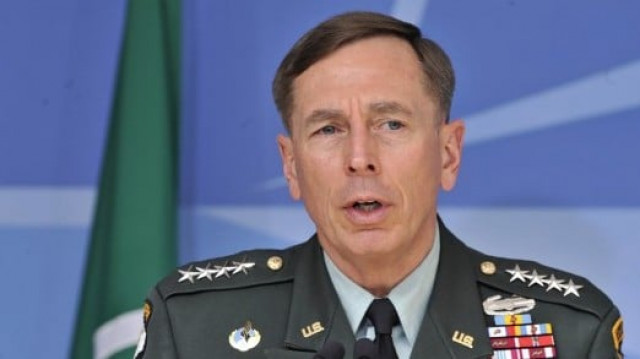Petraeus holds out prospect of reconciliation with Taliban
US Commander cites possible negotiations with leaders with “blood on their hands.”

Petraeus holds out prospect of reconciliation with Taliban
“It doesn’t mean that Mullah Omar is about to stroll down main street in Kabul anytime soon and raise his hand and swear an oath on the constitution of Afghanistan,” Petraeus said in an interview with NBC’s “Meet the Press.”
But he said there was “every possibility, I think, that there can be low- and mid-level reintegration and indeed some fracturing of the senior leadership that could be really defined as reconciliation.”
Petraeus, who took command in Kabul following the sacking of his predecessor General Stanley McChrystal, famously exploited rifts within Iraq’s insurgency to turn around a losing US-led war there.
He now has less than a year to show results in Afghanistan where what he described as a “Pashtun insurgency” operating from Pakistan has exposed the weakness of the government in Kabul and the NATO-led force backing it.
But in the interview Petraeus drew attention to vulnerabilities in the insurgency, noting it was “not some kind of monolithic Taliban enemy” but rather a syndicate of insurgent groups that are not subservient to each other.
These include the Afghan Taliban in the south, the Haqqani network in the east, the Hezb-e-Islami led by Gulbuddin Hekmatyar, the Pakistani Taliban, and smaller numbers of al Qaeda and Uzbek fighters.
“What is interesting is that the Taliban leads from the rear, as we would say. The Taliban leads from Pakistan,” the general said. “And by the way, the rank and file is just catching on to this.”
“We actually see discussions among them, chatter among them, conversation, wondering where their senior leaders are, and wondering why Mullah Omar hasn’t set foot back in Afghanistan or even been heard from now in months and months and months.”
“But the senior leaders don’t come in and share hardship and risk with their troopers on the ground, they send messages. They do it by cell phone, or what have you, and that is actually going to be a problem for them,” he said.
Citing the case of a pregnant woman who was flogged and then killed,
Petraeus suggested that the Taliban’s brutal treatment of civilians also was hurting it.
“What they have done is really quite egregious, particularly in the context of the religion and in the context of the normal codes of conduct,” he said.
He said the top priority was to establish security so Afghans can “literally cast a vote for or against the Afghan government, a government that does have to earn legitimacy in their eyes through its actions.”
But noting that the insurgency was being waged largely by Pashtuns, long the country’s dominant ethnic group, Petraeus suggested that reintegrating them into the society would be key to a turnaround in Afghanistan.
“The five-dollar-a-day Taliban are certainly candidates for reintegration into Afghan society and that is actually starting to happen a bit more over time,” he said.
Petraeus said a new policy on reintegration and reconciliation was “fairly imminent.”
Published in The Express Tribune, August 16th, 2010.



















COMMENTS
Comments are moderated and generally will be posted if they are on-topic and not abusive.
For more information, please see our Comments FAQ